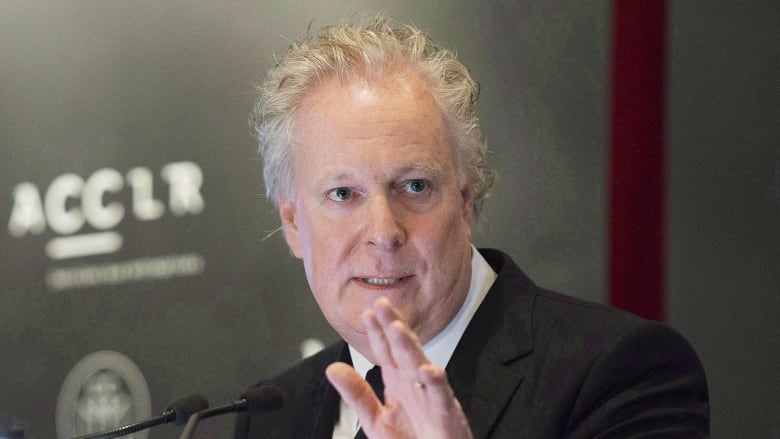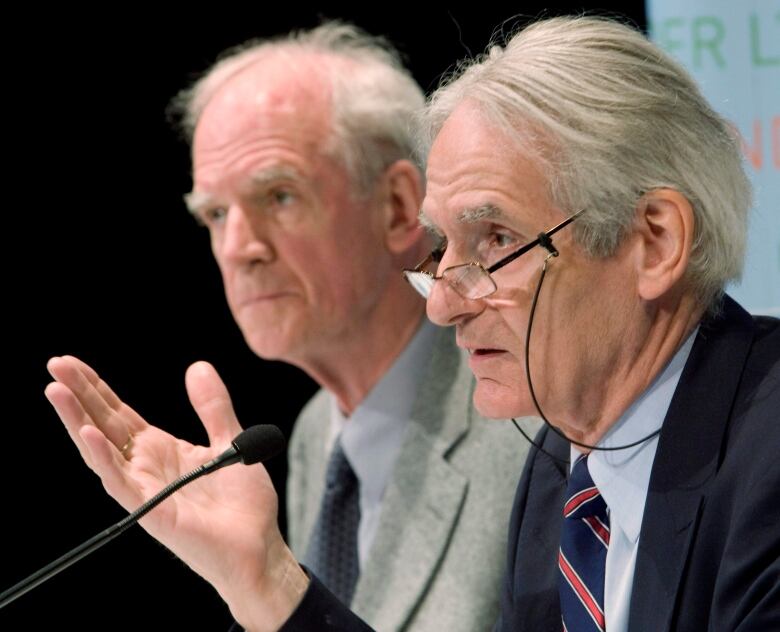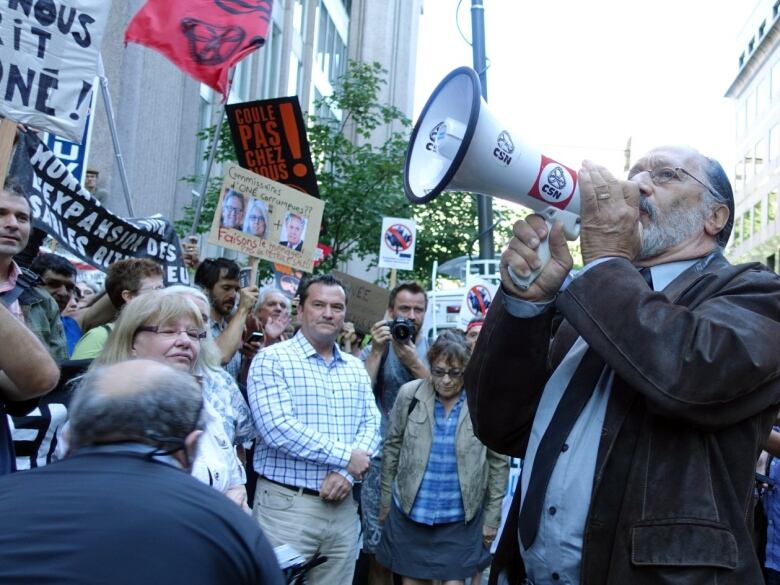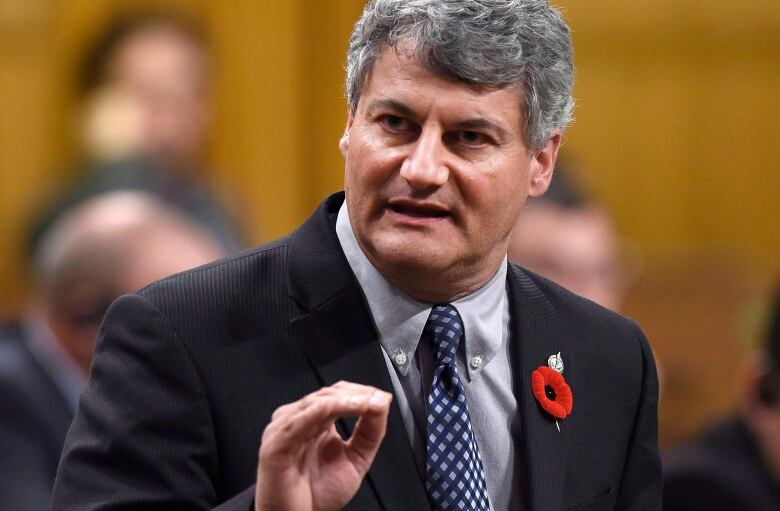Jean Charest walks a fine line on Bill 21 as he launches Conservative leadership bid
Former Quebec premier would not initiate court challenge on secularism law but says Ottawa would have its say

Quebec political debates such as Bill 21 and the stand on pipelines may prove to be thorny issues for Jean Charest, as the former Quebec premier launches his campaign to lead the Conservative Party of Canada.
The former Quebec Liberal Party leader, who served as premierfrom 2003 to 2012, officially confirmed his leadership bid Thursday morning, ahead of an official launch in Calgary.
In an interview with Radio-Canada, Charest was asked about his stance on Quebec's so-called secularismlaw, known as Bill 21, which bans the wearing of religious symbols by some public sector employees, including teachers.
Charest said he would "respect the jurisdiction of provinces" and would not initiate a court challenge of the law.
"Butif it does end up in front of the Supreme Court of Canada, we will have our say," Charestsaid.
Charest emphasized that he would collaborate with Quebec, no matterthe outcome of an eventual court case.

Still, Charest's comments are being interpreted by some opponents of the law as a willingness to seek intervenor status in an eventual Supreme Court case.
"It's interesting to see you know, someone who wants to lead a federal party making those kinds of noises," said Russell Copeman, the executive director of the Quebec English School Boards Association.
Copeman, who also served as a Quebec Liberal MNA in Charest's cabinet, declined to comment on Charest's decision to seek the leadership, other than to say that "the country needs competent experienced leaders in every political party."
Legacy of Bouchard-Taylor commission
Charest said his position on secularism was "well-known" and one that he has "ardently defended." He pointed to his decision as premier to launch the Bouchard-Taylor commission in 2007, on the so-called "reasonable accommodation" of cultural and religious differences.
Still, Charest emphasized that his government received clear legal advice at the time about which measures would be in violation of the Quebec charter and the Canadian Charter of Rights and Freedoms.
That would seem to be a reference to the fact that Bill 21 has so far survived a court challenge only because it invokes Section 33 of the Canadian Charter, the notwithstanding clause.

Copeman underlines that there is a lot of daylight between the Bouchard-Taylor report, which only recommended a ban on religious symbols for those with "coercive authority" such as judges and police officers, and Quebec's secularism law, which includes other authority figures, such asteachers.
"I would say that political parties that supported Bouchard-Taylor those many years ago should take a hard look at Bill 21. Recognize that it goes further than that report, which, by the way, has been in part repudiated by its own authors," said Copeman.
Wading further into Bill 21 will likely be something that Charest wants to avoid, according to Bernard St-Laurent, former CBC political analyst, who covered Quebec politics for 40 years.
"I think that most politicians don't like to deal with issues or problems unless they absolutely have to, especially when they're as sensitive as this one is," said St-Laurent.
He sees Charest's position as similar to that of Prime Minister Justin Trudeau, who declined to become directly involved in the court challengeofthe law, while not ruling out doing so in the future.
As much as Charest might want to avoid it, Bill 21 could well become an issue in the campaign. Brampton Mayor Patrick Brown, who is launching his bid this weekend, has been a vocal opponent of Bill 21, encouraging mayors of other Canadian cities to "join the fight" against it.
Pipeline politics
Charest, who is choosing to launch his campaign in the Conservative party stronghold and oil- andgas-producing province of Alberta, also stated his support for building new pipelines, including for export.
He pointed outthat when he was premier, his government approved construction of a pipeline between Lvis and Montreal.
Charest, who was also environment minister in the Progressive Conservative government of Brian Mulroney, said while all new projects should have to pass environmental reviews, Canada was facing a "new context" given Russia's invasion of Ukraine and its impacton Europe's energy supply.
"What's the alternative? It's to supply the market with countries that don't share our values. I think that Canada can very much be a source of [energy] supply," said Charest.

Charest sparked controversy during 2016 National Energy Board hearings into the now-abandoned Energy East pipeline, when it was revealed he had met with the NEB's chair and two commissionerswhile he was lobbying for TransCanada, the company behind the pipeline.
While Quebec voters have generally been seen to be less favourable to pipeline projects than voters in western Canada, St-Laurent suggests thatposition may shiftbecause of the situation in Ukraine.
"In a way, this debate for him comes at a good time," he said.
Provincial baggage
Political scientist Daniel Bland, the director of the McGill Institute for the Study of Canada, believes that it won't be Charest's stand oncontemporary Quebec political issues, but his legacy as premier and as a cabinet minister in theMulroney governmentthat will be a tough sell for more right-leaning Conservative voters.
"I think it's some of the measures he enacted in Quebec in terms of environmental measures orin terms of tax policy and so forth," saidBland."These policies are not necessarily popular among the conservative base."
And of course, there is the long shadow of the Charbonneau commission into corruption in the construction industry.
While Charest's government was responsible for launching the commissionand for creatingthe province's anti-corruption unit, UPAC, the Quebec Liberal Party and Charest himself were underUPAC's microscope for nearly eight years. That investigation ended quietly in Februarywithout any charges ever having been laid.
Conservative MP Grard Deltell, who has thrown his support behind Charest's leadership bid, does not believe that this history will derail Charest's chances.
"If after eight years of investigation, with 300 interviews by the most seasoned investigators, nothing came out of it, I think we have to turn the page," said Deltell.

Deltell, who led theprovincial Action Dmocratique du Qubecbefore it mergedwith Francois Legault's Coalition Avenir Qubec, was once a political opponent of Charest's, and before that, as a journalist,Deltell followed his career.
From that vantage point, he's seen Charest counted out more than once.
"I think he's the politician whose political obituary has been written most often," said Deltell. "And in the end, he always manages to pull through."
After decades in both federal and provincial politics, at 63, Charest is seen as an underdog in the leadership race. But he brushed off an early pollthat puts himat a distant second place, behind Pierre Poilievre.
"I've seen a lot of polls in my life," he said.
For St-Laurent, the question will be whether a more progressive wing of the Conservative Party coalesces around Charest as a viable candidate to beat Justin Trudeau.
"He won three terms in Quebec and with all kinds of controversy around it," St-Laurentsaid.
"He's a masterful campaigner, and that cannot be underestimated."
With files from Radio-Canada













_(720p).jpg)


 OFFICIAL HD MUSIC VIDEO.jpg)
.jpg)



























































































